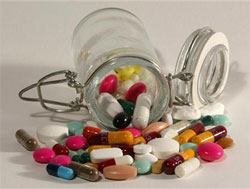
Mumbai, July 5: India has put in place a $5.4 billion policy to provide free medicine to its people, a decision that could change the lives of hundreds of millions, but a ban on branded drugs stands to cut Big Pharma out of the windfall.
e price of drugs is just one factor in access to healthcare and that the scheme need not be detrimental to manufacturers of branded drugs.
"I think this will hasten overall growth of the pharmaceutical industry, as poor patients who could not afford will now have access to essential medicines," said Tapan Ray, director general of OPPI.
About 600 billion rupees in drugs are sold each year in India, or 482 billion at wholesale. Drugs covered under the new policy account for about 60 percent of existing sales, or 290 billion rupees at wholesale cost.
The government's annual cost is likely to be lower due to bulk purchasing and because patients at private clinics would still pay for their own drugs. States will pay for 25 percent of the free drugs and the central government will cover the rest.
Under various existing programmes, around 250 million people, or less than a quarter of India's population, now receive free medicines, according to the health ministry.
India's new policy, to be implemented by the end of 2012 and rolled out nationwide within two years, is expected to provide 52 percent of the population with free drugs by April 2017, at a cumulative cost of 300 billion rupees.
That requires a major funding ramp-up from a deficit-strapped government. The scheme has been granted just 1 billion rupees thus far from central government coffers.
STRICT INSTRUCTIONS
Public doctors will be able to spend 5 percent of the budget, equivalent to around $50 million a year, on drugs outside of the government's list, on branded drugs or on medicines that are not on the list. Beyond that, they can be punished, said Goyal, the health ministry official.
"If doctors are found to be prescribing medicines which are not on the list, or which are branded, then disciplinary action will be initiated," he said.
Free medicine is just one solution to better healthcare in India, where just getting to a state clinic can require a long journey.
Swapnil Yadav, who runs a clinic in Ambegaon, a village 170 km (105 miles) southeast of Mumbai, said India should set up free drug retailers instead of government clinics.
"Patients can approach a private clinic and then get free medicines from government-run medicine shops," he said.
The free generics scheme, which mirrors policies in the states of Tamil Nadu and Rajasthan, is expected to be fully operational by the time voters go to the polls for the 2014 general election, when the populist Congress party will seek a third straight victory.
Indian makers of generics such as Dr Reddy's and Cipla are best placed to benefit.
"The move will please the generics manufacturers who stand to gain substantially in competing for contracts," said KPMG's Stirling.






Comments
Add new comment